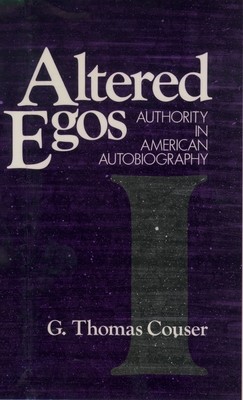
- We will send in 10–14 business days.
- Author: G Thomas Couser
- Publisher: Oxford University Press, USA
- ISBN-10: 019505833X
- ISBN-13: 9780195058338
- Format: 14.9 x 21.8 x 2.6 cm, kieti viršeliai
- Language: English
- SAVE -10% with code: EXTRA
Reviews
Description
This work explores the "authority" of autobiography in several related senses: first, the idea that autobiography is authoritative writing because it is presumably verifiable; second, the idea that one's life is one's exclusive textual domain; third, the idea that, because of the apparent congruence between the implicit ideology of the genre and that of the nation, autobiography has a special prestige in America. Aware of the recent critiques of the notion of autobiography as issuing from, determined by, or referring to a pre-existing self, Couser examines the ways in which the authority of particular texts is called into question--for example, because they involve pseudonymity (Mark Twain), the revision of a presumably spontaneous form (Mary Chesnut's Civil War "diaries"), bilingual authorship (Richard Rodriguez and Maxine Hong Kingston), collaborative production (Black Elk), or outright fraud (Clifford Irving's "autobiography" of Howard Hughes). Couser examines both the way in
which canonical autobiographers may playfully and purposely undermine their own narrative authority and the way in which minority writers' control of their lives may be compromised. Autobiography, then, is portrayed here as an arena in which individuals struggle for self-possession and self-expression against the constraints of language, genre, and society.
EXTRA 10 % discount with code: EXTRA
The promotion ends in 21d.07:46:06
The discount code is valid when purchasing from 10 €. Discounts do not stack.
- Author: G Thomas Couser
- Publisher: Oxford University Press, USA
- ISBN-10: 019505833X
- ISBN-13: 9780195058338
- Format: 14.9 x 21.8 x 2.6 cm, kieti viršeliai
- Language: English English
This work explores the "authority" of autobiography in several related senses: first, the idea that autobiography is authoritative writing because it is presumably verifiable; second, the idea that one's life is one's exclusive textual domain; third, the idea that, because of the apparent congruence between the implicit ideology of the genre and that of the nation, autobiography has a special prestige in America. Aware of the recent critiques of the notion of autobiography as issuing from, determined by, or referring to a pre-existing self, Couser examines the ways in which the authority of particular texts is called into question--for example, because they involve pseudonymity (Mark Twain), the revision of a presumably spontaneous form (Mary Chesnut's Civil War "diaries"), bilingual authorship (Richard Rodriguez and Maxine Hong Kingston), collaborative production (Black Elk), or outright fraud (Clifford Irving's "autobiography" of Howard Hughes). Couser examines both the way in
which canonical autobiographers may playfully and purposely undermine their own narrative authority and the way in which minority writers' control of their lives may be compromised. Autobiography, then, is portrayed here as an arena in which individuals struggle for self-possession and self-expression against the constraints of language, genre, and society.


Reviews